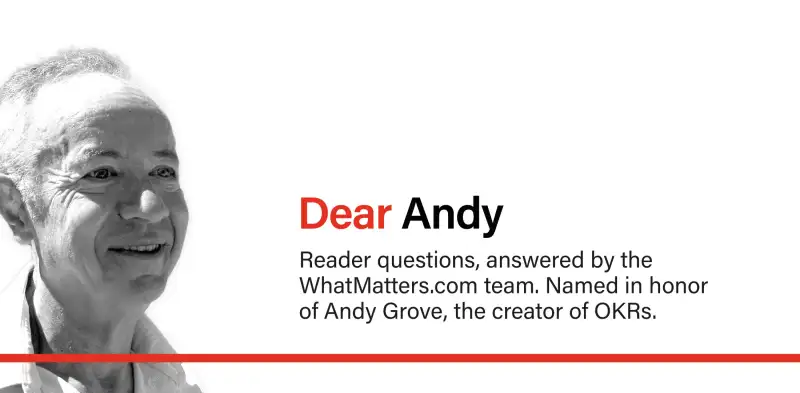Dear Andy,
I’m managing a team for a very fast moving startup. We’re using OKRs, but have found our priorities have been changing so quickly that by the time it comes to grade our OKRs, we’ve already moved on from them. Some of my team members are starting to get frustrated and are wondering if OKRs are worth the effort. Any advice on how to better use OKRs for a rapidly-changing environment?
Sincerely,
Geeta

Hi Geeta!
Thanks for writing in.
One of the most important (and beneficial) hallmarks of OKRs is their flexibility. Don’t feel your OKRs need to be immovably set in stone. OKRs should reflect your priority at the moment. If your priority changes, so will your OKRs — simple as that. This, however, can be frustrating for teams if it happens too often, so here are a couple of ideas to help make this process a little easier.
How often are you setting your OKRs? We generally recommend teams write them quarterly, but that’s not a hard and fast rule. Consider sports teams and their off-seasons, or schools and their summer breaks. Or early-stage startups like yours, where the environment is so dynamic that three months can be an eternity. Goal setting doesn’t always fit within a quarterly framework, and your OKR cadence can be adapted to your needs. Or you might experiment and try different cycles as a testing ground to find what works best.
It sounds like, in your line of work, a more frequent cadence would be beneficial. Take some time and figure out how far ahead you can realistically plan your goals without losing important work and diminishing team morale. Six weeks might be a better fit for your team — but we wouldn’t recommend going any shorter than four. If you go with a shorter cadence, remember that KRs will be expected to progress at a more rapid pace — we’re talking daily, weekly at most. This also means more frequent check-ins.
It is, of course, frustrating to feel like you’re throwing work away, so consider writing at least one OKR that you expect to take several cycles to achieve. Keep the Objective, but write Key Results that show steady progress from cycle to cycle. It’s also possible that you don’t need to toss out an OKR entirely. Consider replacing a lower-priority KR with one that better reflects your new priorities or adjusting the wording of your Objective.
Situations like these highlight the importance of CFRs. Team members need to be able to express opinions (positive or negative) about the process and know that their concerns are being listened to and taken seriously. It does sound like you’re doing that (or else you wouldn’t be writing in), but I just wanted to confirm you’re doing the right thing and encourage you to keep up the good work :)
With practice, you’ll find the cadence that works for your team and, hopefully, improve in your ability to list an OKR that is more resilient to your organization’s needs.
Thanks again for writing in, and best of luck to you and your team on your OKR journey.
Sincerely,
Billy from the What Matters Team

Have a question for Dear Andy? Click here to submit your OKR queries.
